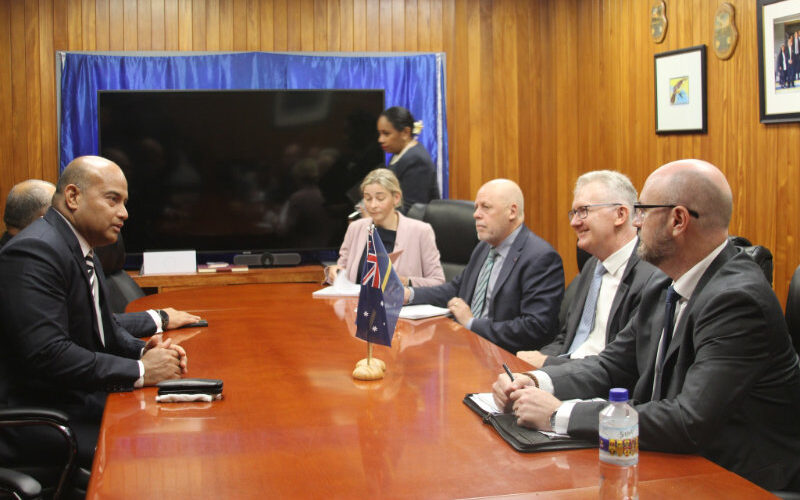
The Labor Government’s deal with Nauru to resettle unwanted refugees will cost Australian taxpayers billions, spent on who knows what. Alison Battisson reports.
So far, the Government has transferred at least $388m to a trust fund which solely benefits the Nauruan Government, without signing a stand-alone trust deed to govern how the money is spent or otherwise controlled.
By the Australian Government’s own projections, at least $2B could be transferred to this trust fund.
But how is the trust fund governed, and by whom? We are not to know. Our Freedom of Information request to the Department of Home Affairs for the Memorandum of Understanding (MOU) between Australia and Nauru, and the trust deed setting out the financial arrangements for the MOU, was met with “no discrete document exists.”
MWM received a completely blacked-out copy of the MOU. Even the title was blacked out. The reason given is that the MOU falls within an FOI exemption for “documents affecting National Security, Defence or International Relations.” Specifically:
“The phrase ‘international relations’ has been interpreted as meaning the ability of the Australian Government to maintain good working relations with other governments and international organisations and to protect the flow of confidential information between them. The expectation of damage to international relations must be reasonable in all the circumstances, having regard to the nature of the information; the circumstances in which it was communicated; and the nature and extent of the relationship. There must be real and substantial grounds for the conclusion that are supported by evidence.
“The information contained in the document relates to confidential agreements between the Australian Government and the Republic of Nauru. The Republic of Nauru is a sovereign nation and the Government of Nauru is responsible for granting long-term visas to people who no longer have a legal right to remain in Australia.
“I consider releasing the information marked ‘s33(a)(iii)’ would adversely impact on the ability of the Department to maintain good working relations with the Government of Nauru. This assessment is made considering the nature of the information contained within the document and the current nature and extent of the Australian Government’s relationship with the Government of Nauru.”
What’s the secret?
What is in the MOU that could “adversely impact on the ability of the Department [of Home Affairs] to maintain good working relations with the Government of Nauru”, given the billions Australia is sending to Nauru?
The MOU governs the transfer of the ‘NZYQ cohort’ to Nauru, named after the High Court of Australia case (NZYQ v Commonwealth of Australia) that determined immigration detention of people who cannot be removed from Australia within the reasonably foreseeable future is unconstitutional.
Nauru refugees. Indefinite detention a definite breach of High Court ruling
Many of the cohort have criminal records and the Australian Government has determined that despite serving their criminal sentence, despite their connections to Australia (ie Australian citizen partners, children and businesses) and despite the fact that some grew up in Australia.
In other words, despite the country that most shaped their character being Australia, it is politically expedient to demonise them and then remove them from Australia. This political strategy, however, comes at a cost.
Money for refugees
The only country willing to take members of the NZYQ cohort is Nauru. And Nauru is only willing to do this for large sums of money.
When the first person was transferred to Nauru approximately two weeks ago, Australia paid the Nauruan Government $20m and placed $388m in a trust fund. Two more people have followed, which triggered further payments.
Over the life of the arrangement,
Australia will transfer at least $70m a year to the trust fund, or approximately $2B in total.
And it appears the money is being transferred without a governing document, beyond an MOU, a type of document normally big on aspiration and short on detail.
This is despite a Department of Home Affairs staffer giving evidence to the Senate on 3 September 2025 that a trust deed was in the process of being negotiated. As Senator Pocock commented at the time, the cost of the arrangement with Nauru and the lack of due diligence is “totally bonkers.”
Where will the money be spent?
The trust fund into which Australia’s money is being transferred is supposedly for the benefit of the Nauruan people. Since 2013, Australia has paid the Nauruan Government approximately $13B for the offshore processing of people seeking asylum in Australia, well over one million dollars for every Nauru inhabitant. The additional $2B (and counting) represents another $180,000.
To put those figures into perspective, Nauru’s GDP per capita is approx. $20,000 (2024), and it has one of the poorest socio-economic indicators in the world.
According to global poverty fighter, the Borgen Project, one in four Nauruans live below the poverty line, unemployment rates are high, and 71% of Nauruans are obese. Further, there remains no ability to treat serious illness on Nauru.
It is unclear what benefit the Nauruan people have received from the billions already given to their government by Australia, and it is unclear how transferring more billions will improve the socio-economic position of the Nauruan population (who are in the process of being moved to higher ground due to climate change).
Instead, the money has and must be going elsewhere.
The people of Nauru are meant to accommodate people Australia doesn’t want and who don’t want to be on Nauru, and who the Australian Government keeps insisting are “murderers and rapists.”
The only people who benefit from the arrangement are Nauruan politicians and the Australian Government, which has effectively shut down migration and refugee matters as an election issue by banishing vulnerable people who can’t vote to a remote Pacific Island.
Exile to a vanishing shore: human rights, climate and the Nauru ‘solution’